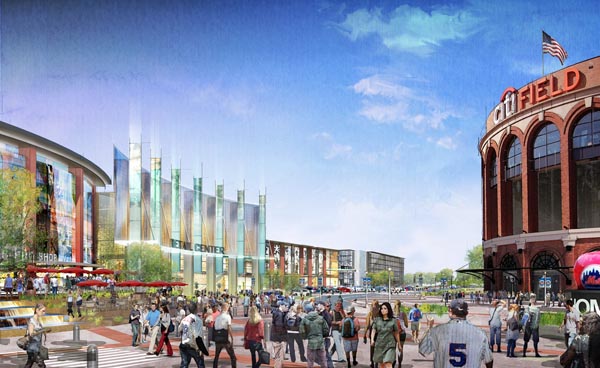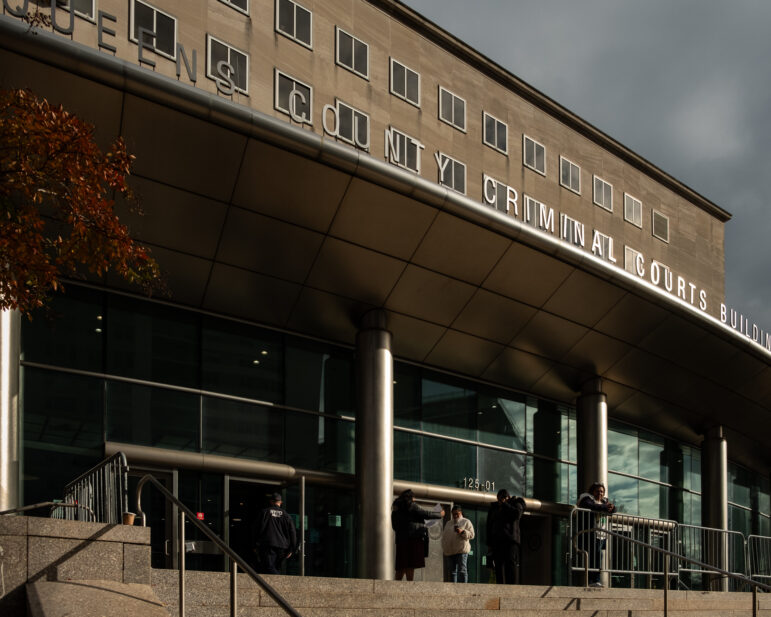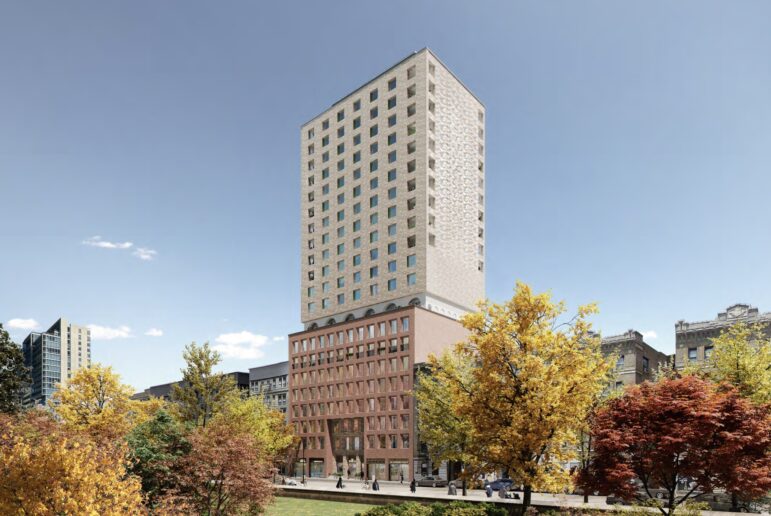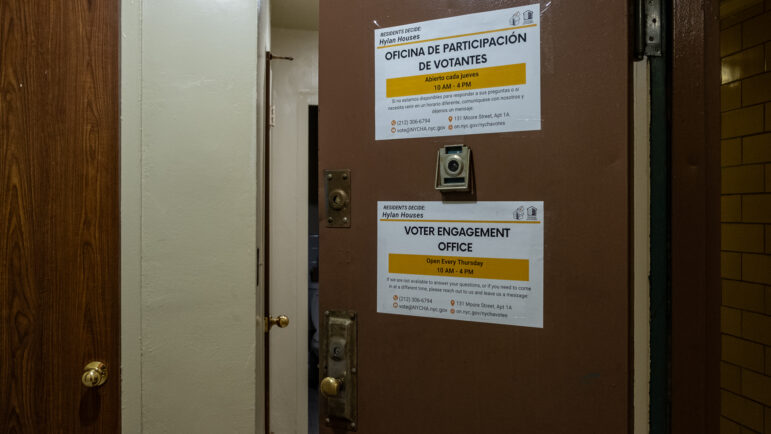
The new Willets Point plan includes development on both sides of Citi Field: to the east, in the area known as the iron triangle, and to the west, in a parking lot where a shopping mall is supposed to go.
Three years ago, City Limits wrote about a bit of legal minutiae that had become part of the long struggle over a Bloomberg administration scheme to redevelop Willets Point in Queens. On Thursday, a state appeals court ruling about that very language threw a significant roadblock in the city’s plans.
Willets Point is an area that broadly encompasses CitiField and its corner of Flushing Meadows Park as well as the area known as the Iron Triangle, a rough-looking but highly functional collection of auto-repair, scrap metal, hauling and other businesses located to the east of the park. The Bloomberg administration—which often took steps to replace decent blue-collar jobs with brighter, shinier things—initially sought to remake the whole area in one fell swoop, but then scaled the plans back.
The first stage of the revised plan was a shopping mall to be built on a parking lot near the Mets stadium. Selected to build the mall were Related Companies and Sterling Equities, the owner of the Mets. (As Patrick Arden pointed out in an eye-opening 2013 story, the Sterling-Related partnership somehow won the deal despite proposing a casino for the site, something the city didn’t ask for and is not permitted by law. It is not part of the current plan.)
There was one problem with the shopping-mall plan: The parking lot where the mall was to be built was part of the park, and you can’t just up and decide to use parkland for something that has nothing to do with a park, like, say, a mall. So the city argued that the 1961 law that permitted the construction Shea Stadium, the first home to the Mets, allowed land near it to be used for a range of purposes.
Arden’s 2012 article explained:
[Robert] Moses presided over the 1961 groundbreaking for Shea Stadium. He had originally offered to build the municipal arena in Flushing Meadows for the Brooklyn Dodgers and resurrected the plan when the city pushed for a new National League franchise.
The state Legislature approved his building of Shea Stadium in the park, but its 1961 legislation was primarily aimed at granting the city authority to issue bonds to finance construction. It loosely laid out the permitted uses for the stadium and grounds, listing “recreation, entertainment, amusement, education, enlightenment, cultural development or betterment, and improvement of trade and commerce.” The law even allowed the city to use the site for “any business or commercial purpose,” so long as this activity “aids in the financing of the construction and operation of [the] stadium, grounds, parking areas and facilities” and “does not interfere with the accomplishment of the purposes referred to” above.
… The Parks Commissioner could enter into agreements to use part or all of the stadium grounds, but any agreements lasting for more than a year had to be approved by the Board of Estimate, which included the mayor, the comptroller, the City Council president, and all of the borough presidents.
In 1989, the U.S. Supreme Court found the Board of Estimate unconstitutional, because it violated the “one man, one vote” rule—for example, the borough president of Brooklyn (the city’s most populous county) had no more power than the borough president of Staten Island (the least populous county). With the elimination of the Board of Estimate, the city’s Law Department says, the power of site approval under the 1961 Shea Stadium law now rests solely with the mayor. A shopping mall may not offer the “enlightenment” referenced in the text, but a Bloomberg administration spokesperson describes the new project as a “retail/entertainment complex” benefiting “trade and commerce.”
To facilitate the Sterling-Related mall, the city employed an interesting interpretation of the law, Arden reported:
The city cites the law in apparently contradictory ways. On one hand, it argues the 1961 legislation authorizes alienation of the parkland, thereby dismissing all of the public’s claims to the land or for compensation. But the law never mentions alienation. Indeed, it describes the land as “being a part of Flushing Meadow park.”
When asked about that omission, the city responds with a different interpretation: The law authorizes the placement of a shopping mall on the land, which, the city responded, would still be in the park. The city denied requests to speak directly to its lawyers about the shopping mall project, but Seth Pinsky, president of the city’s Economic Development Corporation, recently assured the Queens Chronicle, “We are confident it’s legal.”
A group of Willets Point opponents led by State Sen. Tony Avella sued, saying the city was distorting the clear intent of the 1961 law. A lower court sided with the city. But on Thursday, the appellate division of the state’s first judicial department overturned that ruling. Its decision read in part:
We take no issue with the notion that Willets West is a potential driver of trade and commerce, and that it is a worthy first step in the City’s long-stated desire to breathe new life into a neighborhood that is in dire need of improvement. However, the public trust doctrine is clear that any alienation of parkland must be explicitly authorized by the legislature. No reasonable reading of Administrative Code section 18-118 allows for the conclusion that the legislature in 1961 contemplated, much less gave permission for, a shopping mall, unrelated to the anticipated stadium, to be constructed in the Park. Further, it is simply not in our power to set the doctrine aside, no matter how worthy a proposed use of parkland may be. Here, while there is a legislative mandate for the use of the Park, that mandate does not encompass the use proposed by respondents. Thus, the Willets West project must be enjoined.
In a statement released Thursday, the city’s Law Department said: “We are disappointed in the Court’s decision and are reviewing our options.”
To read Arden’s comprehensive take on the Willets Point saga, check out his November 2013 series, “The Lessons of Willets Point.”








6 thoughts on “Ruling Stalls City Plans for Willets Point: Key Background”
yes the people won yesssssssssssssssssssssssssssssssssssssssssssssssssssssssssss
mets owners loose this is great , hey hey hey goodbye
Pingback: Borough Of Queens Finance Office | Your Stock Market Place
What neighborhood? If you destroy the Willet’s point shops, it is no longer.
Pingback: Urban Omnibus » High Summer Roundup
Pingback: Can the Auto-Repair Sector Survive the Jerome Ave. Rezoning? | North Road Auto (845) 471-8255 Poughkeepsie